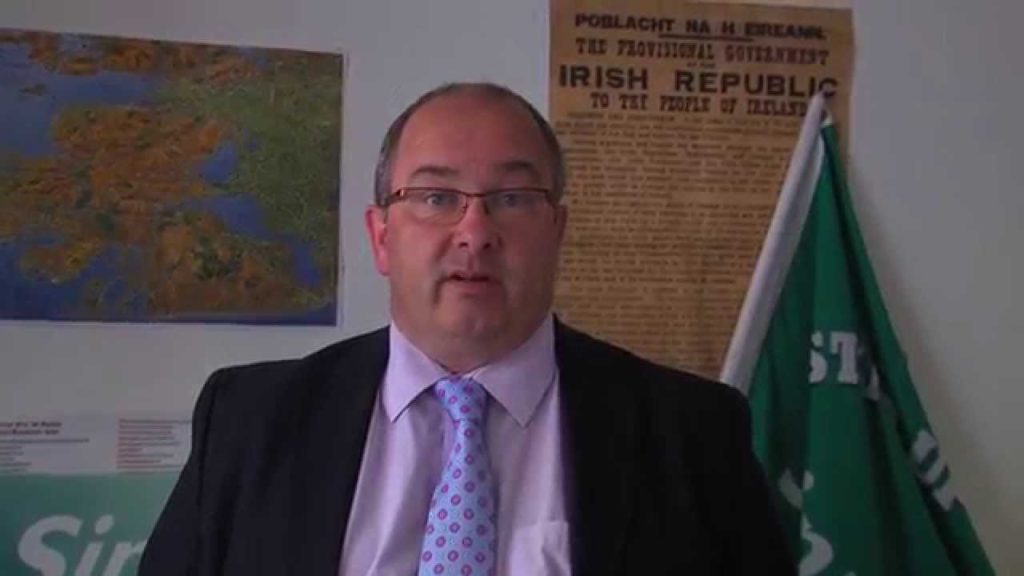01.12.2017 - 12:09
England-born Trevor Ó Clochartaigh (1968) is an Irish senator with Sinn Féin whose career includes a stint in Britain’s Labour Party. Ó Clochartaigh was one of the international observers who monitored Catalonia’s self-determination referendum on October 1. He is also a member of Oireachtas Friends of Catalonia, the Irish parliament’s friendship group on Catalonia. In this interview he is rather emphatic about Spain’s reality. He believes that PM Rajoy and his ruling Partido Popular will reject the Catalan election results on December 21 and he will attempt to maintain Madrid’s direct rule on Catalonia via Article 155 of the Spanish constitution. That is why he envisions a scenario of civil disobedience.
—In your view, what is going on in Catalonia at the moment?
—If someone asked me that question, I’d say that we are seeing some serious violations of human and civil rights. That democratically-elected political leaders are in jail or exiled. Or in danger of being jailed or exiled. And that applies to MPs, cabinet ministers and the Speaker of the House. All that because the Spanish state has charged them with sedition, which is the equivalent of treason. This stems from a referendum held and organised by the government and the parliament of Catalonia. Catalans were asked to vote on the possibility of being an independent country. That’s what I would say to someone who didn’t know anything about it.
—What advice would you give to the Catalan leaders? We declared independence but, shortly afterwards, Madrid imposed direct rule. Half the government is in exile, the other half is in prison. Should we vote in these elections? What should we do next?
—I believe you are doing the right thing. And I believe that an international consensus is important. More governments, political parties and international figures must be persuaded that this is not a Spanish internal affair, but one that concerns many more people. Foreign action is of paramount importance. We will maintain our commitment and support. That is crucial. I believe you need to overcome the hurdle of the snap elections and ensure that you receive as strong a mandate for self-determination as possible. That would send a powerful message. I’d say you’ll have to go down the path of civil disobedience. Strikes, general strikes and so forth. You will also need to take diplomatic initiatives within Spain to garner greater support among Spaniards. I’m talking about Spaniards who are not part of the state’s structure and condemn the Guardia Civil’s violence. Open-minded people. This consensus will need to be built in Spain, too. And a day will come when you will see that a larger number of Spanish MPs understand Catalonia’s demands.
—Why do you feel that we should go down the path of civil disobedience? What makes you say that?
—History has shown us that the Spanish state has every intention of staying united and will do whatever it takes to ensure that its borders aren’t redrawn. Even in the event of a crushing victory [for the separatist camp] in the December elections, they won’t recognise the result. Madrid will attempt to stretch today’s direct rule. They will use every resource to remove from power anyone who supports independence or even self-determination. They will take legal and financial action. They will stick to their current tactics. We, the observers, were blown away by the bottom-up nature of your movement. It was all down to the people, the citizens. Well, that’s your greatest strength. But it will be a very tough campaign. Very. The Spanish state will not give up one inch of ground willingly. It will be a complex, drawn-out campaign.
—Did you ever expect a conflict like this, with half our government in prison, in 2017 and in the heart of Europe.
—I’m not too surprised, actually. I suppose our history with the British state and remembering how they used to behave has something to do with that. As a political party, historically we have had ties with the Basques and we have seen how they were treated. And the difficulties they faced. That’s why I’m saying that I’m not surprised, to be honest. But I think that the key issue here is how all this puts democracy into question in the EU. On the one hand, the EU stands up for civil and human rights, but when doubts are cast within its borders and in a member state, the attitude changes. They are quick to condemn outside the EU, but they go all shy when it’s time to condemn the Spanish authorities. When it’s a European government or parliament, they don’t behave the same way. This raises a big question today. Many Europeans and also many political parties are wondering what is going on, even if they have no power. And they are very concerned by what they’ve seen. I believe that this case weakens the European project.
—You were in Catalonia on October 1 as an international observer. Can you tell us about the experience?
—I was a member of a delegation which consisted mainly of elected officials and we came here as referendum observers. We were allowed to move freely and talk to anyone we needed to. We travelled to several polling stations. I personally witnessed first hand the police violence against civilians, particularly against a man in his late seventies. We all saw the excessive use of force, how ballot boxes were seized and people were removed aggressively. In another polling station we saw the ballots being counted. That was our job: to observe, talk and make notes. Finally we issued a communiqué.
—Mr Dastis, Spain’s Foreign Minister, claims that the violence is “fake news”.
—I don’t know if Mr Dastis was in Catalonia [that day]. I was. I saw violence. Mr Dastis is wrong. Totally wrong. In fact, a number of the observers in our delegation were hit by rubber bullets. One even showed us a rubber bulled that they had picked up. So, a number of us felt and witnessed the violence by the Spanish police ourselves. Spain’s Foreign Minister is mistaken. At least on that point. I am categorical about this because I saw it with my own eyes. I took my own photos and video footage. And I have seen other video material from colleagues and reporters. I saw people being clubbed on their heads. I categorically state that I witnessed the violence on site and the Guardia Civil was the culprit. None of the members of our delegation saw any violence by the Catalans. They did not lift a finger. The Guardia Civil were not provoked at any point. It was all very peaceful, civilised and proper.
—I’d like to know what initiatives there are in Ireland to discuss the Catalan case.
—Both chambers have held debates about the current state of affairs in Catalonia. All political parties have discussed the issue and voiced their concern. We, Sinn Féin, were one of the few parties to decry the actions of the Spanish government and state. The others were more inclined to call it “a Spanish internal affair”. We have also held formal and informal meetings in the chambers.
—How does the press in Ireland see it?
—I’d say that most mainstream media in Ireland tend to buy Madrid’s side of the story. I noticed this myself when I was an observer. The press can be very biased. I pointed this out. At the end of the day, they tend to endorse the position of the EU and most heads of state, which is favourable to Madrid and the Spanish state. MPs and particularly my party must balance out the situation. That’s why we have held public events in several cities across Ireland. The Sinn Féin’s National Conference was held in Dublin with ERC’s MEP Jordi Solé as our guest speaker. We want to ensure that we keep abreast of any developments.
—Half our government is in jail, half in exile. Isn’t this a turning point for the Irish government?
—No. We are very critical of the Irish government. We believe that there’s been a fundamental violation of human, civil and democratic rights.
—What rights?
—Free speech is banned even ahead of the elections, when they won’t even allow some people to discuss independence. Or take the case of the school teachers who stand accused of holding a debate in class about the referendum. All these cases stand out. We also emphasised the fact that Amnesty International condemned that both Jordis were remanded in custody. That is another violation of civil rights. But over here the political mainstream seems to be under the umbrella of the Spanish authorities. I honestly think that they are afraid to discuss the issue because that would shatter the narrative which they have espoused so far.
—That’s shocking, when you consider how important separatism is in Irish history.
—Absolutely. The trouble with Ireland’s Fine Gael government is that they get on well with Spain’s Partido Popular. They’ve had close ties for years. And that connects them with Angela Merkel and the tories. It’s hardly surprising that the conservative parties that work together in Europe, also do that when it comes to Catalonia. Still, I think it’s a mistake. They’re totally wrong. It’s a disgrace.
—Are there are cracks in the Irish government? Do you anticipate any condemnation?
—Nothing would stop them. But, no I don’t think they will do that, politically. As allies, they are too close. I think it’s important that in Scotland Nicola Sturgeon has publicly decried the situation. And our leader, Gerry Adams, has openly condemned the actions of the government. The more condemnations, the better. Equally important were the statements by The Elders, Kofi Annan and Amnesty. Ultimately, the outcome of the judicial process in Brussels will be key. It is important to see whether the Belgian authorities allow president Puigdemont and his ministers to stay or they are extradited. It’ll be key to the present campaign.
—Why is that?
—If they are extradited to Spain, it will be an uphill struggle. But if they stay in Belgium, they will be able to present their case much more easily.
—Is there anything else you’d like to add?
—Only that I was very honoured to be an observer and see for myself the stuff Catalans are made of. The dignity, pacifism and open-mindedness I saw in the ones I met. I hope you are able to find a peaceful resolution and the international community does what it is supposed to and intervenes so that the conflicted may be resolved fairly.



